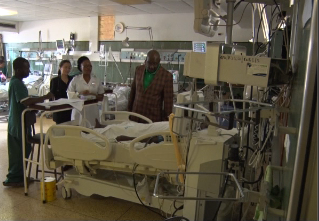KAROI — Ratidzai Moyo (33) of Chikangwe high density suburb is five months-pregnant and has suffered from the life threatening disease malaria twice within the last six months.
Moyo told NewsDay that she was a victim of a recurrence of the malaria scourge that gripped Chiedza suburb in the farming town three years ago.
She said there was a recurrence of malaria outbreak in Ward 10 while responsible authorities took long to curb it.
“As you can see, we have many water bodies around Chikangwe. We are victims of mosquitos around here,” she said.
Moyo is not the only one facing the malaria predicament here as many residents have complained of the disease.
Positive rate
When provincial Epidemiology Disease Control officer, Gift Masocha, visited Chiedza suburb during a testing campaign, out of 390 people tested, 190 were found positive to malaria infection.
The figure translated to a 48% positive rate that saw the establishment of health clubs to scale up awareness campaigns, as a critical intervention measure.
Ironically, health campaign have not yielded any positive results for many residents in Chikangwe and other suburbs in the farming town.
Population Services International partnered with Ministry of Health and Child Care for a 10-year advocacy campaigns in mainly malaria prone rural outskirts including Hurungwe district where mosquito nets were distributed freely.
In Chiedza the malaria control unit is religiously spraying anti-malaria pesticide where residents are “safe” from malaria.
Divide and rule
Zimbabweans commemorated World Malaria Day on April 25. Ward 3 councillor, Stewart Jena, complained of the “divide and rule” methods he said were used in dealing with malaria in Karoi by health officials.
This is the case around other places around Zimbabwe.
“We informed the council’s Environmental Health department and got assurances it will be solved but to no avail,” Jena said.
Sources revealed that mosquito nets distribution was done with the supervision of the environment health office.
Fatal
A malarial attack can turn fatal if there is no early intervention.
“We do not know why they are not acting, as nearly every rural clinic has mosquito nets outnumbering affected communities,” said a source who declined to be named.
A local doctor confirmed that uncomplicated malaria can turn fatal.
“It is not advisable that patients get the same medication after a few days or months of the same disease,” he said.
“There is need to react urgently on this medical crisis in Karoi town.”
But Masocha, the provincial Epidemiology Disease Control officer, begged to differ. He said Hurungwe was no longer badly affected after the rate significantly declined since 2016.
“We had 21 people per 1 000 affected by malaria in 2016, and 5 per 1 000 in 2017 while only 2 where affected this year,” Masocha said.
Hurungwe has four doctors and 88 nurses, 30 outlying clinics and three outlying hospitals with a catchment population of 410 181.
“We are ready if resources are timely availed and adequate consultations on the chemical of choice for IRS are done,” Masocha said.
Community Working Group on Health officer, Esther Sharara, said they were implementing health literacy programmes in Manicaland’s 35 districts where Nyanga, Chimanimani, Chipinge, Mutasa and Mutare are high burden districts.
“Malaria affects pregnant women as being pregnant lowers immunity resulting in many women passing on due to the disease,” she said.
“Stakeholders like Global Fund, USAID among others have mobilised funds to fight TB, Malaria and Aids as interventions in the communities in the country.”
Malaria is the third leading cause of illness and mortality in Zimbabwe, with 45 of the country’s 62 districts are malarial, with 33 categorised as high burden malaria areas. The 2002 malaria stratification estimates that about half the population is living in high-risk areas.
In its weekly surveillance report last week, the Ministry of Health and Child Welfare reported a total of 5 997 malaria cases and five deaths for the week ending March 5.
“This comes as deaths from malaria in Zimbabwe last year outstripped the 2016 figures amid indications that the number of people succumbing to the old age disease is still high. Zimbabwe recorded 518 deaths from malaria in 2017, compared with 231 for the whole of 2016 and 462 the previous year,” reads the report in part.
According to World Health Organisation 2018 theme ‘Ready to Beat Malaria’ but for many residents in Karoi, there is no winning for divided communities.
Key facts according to World Health Organisation WHO
- Malaria is a life-threatening disease caused by parasites that are transmitted to people through the bites of infected female Anopheles mosquitoes. It is preventable and curable.
- In 2016, there were an estimated 216 million cases of malaria in 91 countries, an increase of 5 million cases over 2015.
- Malaria deaths reached 445 000 in 2016, a similar number (446 000) to 2015.
- The WHO African region carries a disproportionately high share of the global malaria burden. In 2016, the region was home to 90% of malaria cases and 91% of malaria deaths.
- Total funding for malaria control and elimination reached an estimated $2,7 billion in 2016.
- Contributions from governments of endemic countries amounted to $800 million, representing 31% of funding.









